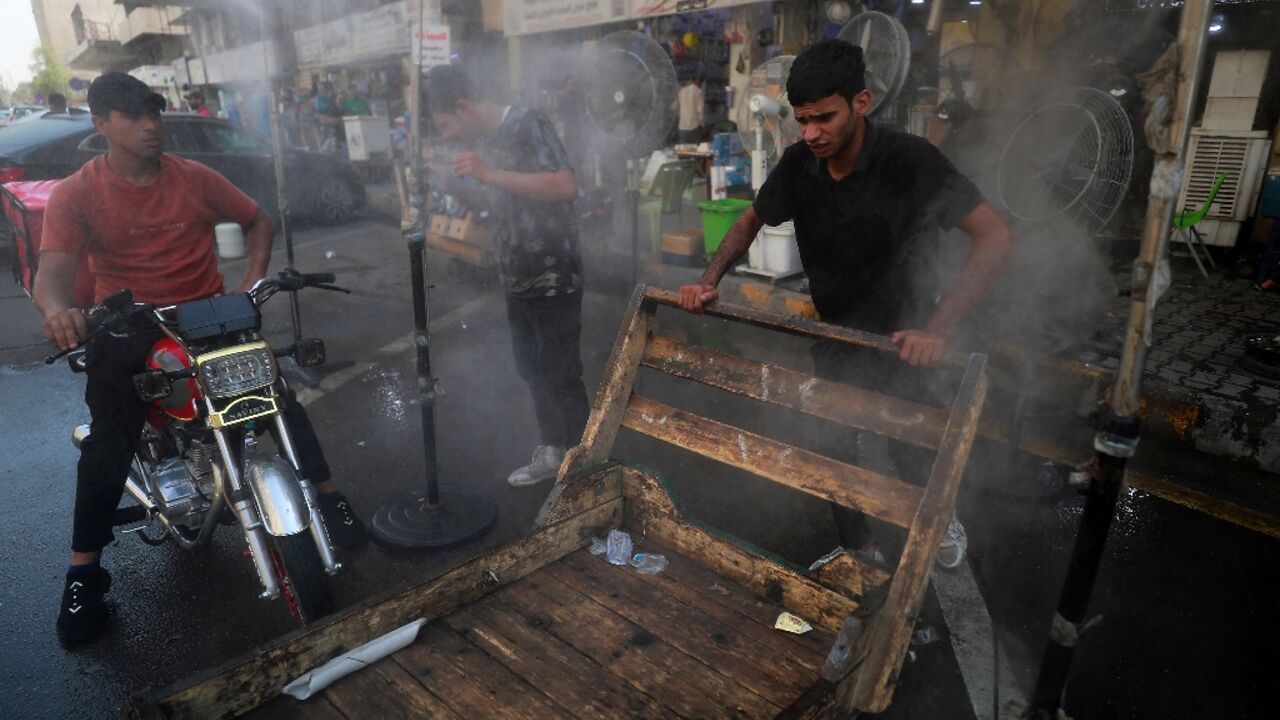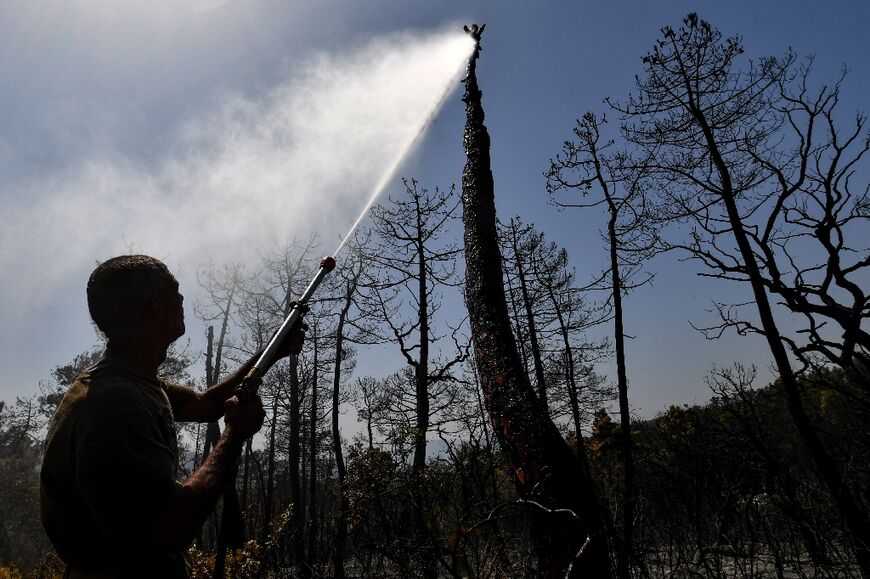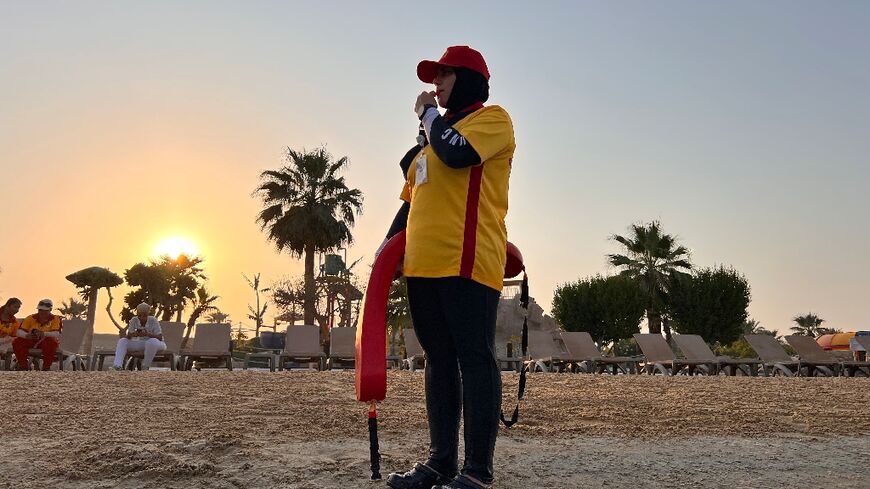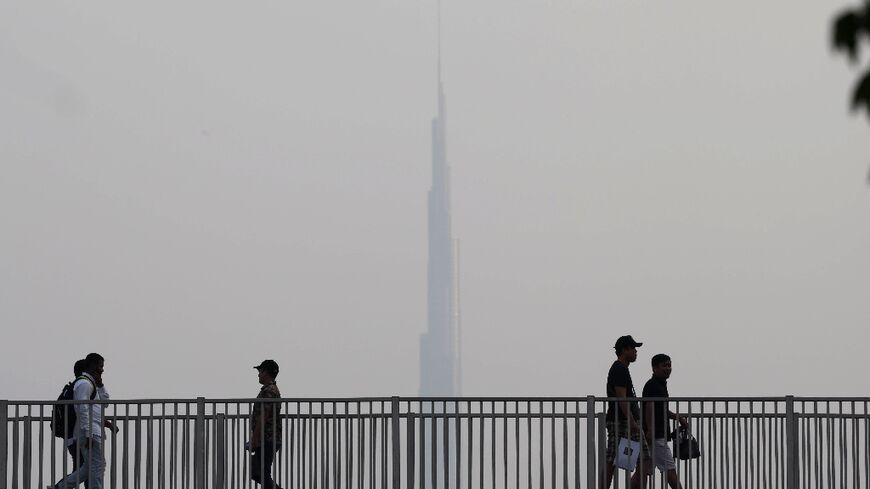Where summer heat hits hard: Mideast and North Africa

Climate change has impacted the Middle East and North Africa where summer is already very hot. Many in Iraq, Syria, Tunisia and Saudi Arabia still labour in the heat.
- A tool of the trade in Syria -
Heat is a tool of the trade for blacksmith Murad Haddad in the city of Idlib in northwest Syria.
"We make everything by hand here. We get up early to try to avoid the extra heat we're exposed to as well as the flames," the 30-year-old told AFP.
He and his five brothers take it in turn to use skills handed down by their grandfather as they toil in torching temperatures.
As he strikes the glowing iron with his hammer, a tattoo on his forearm states categorically that "My life is painful".
From time to time he removes his shirt and wipes away the sweat dripping from his beard and drinks tea, standing under an ancient fan suspended from the ceiling.
"We work up close to the fire for five or six hours, until two or three in the afternoon. It consumes us," he said.
"The heat is killing us. I have six kids, and I can hardly look after them. But if I don't work, I can't make ends meet."
- Hot food at 50°C in Baghdad -
Maoula al-Tai is 30 and delivers takeaway food in Baghdad where he roams the city on a backfiring moped.
When the mercury rises above 50 degrees Celsius (122 Fahrenheit), as it did at the beginning of the week, he is one of the few to venture out onto deserted streets.
"Sometimes it hits 52, 53 or 54. That's not normal. Nobody can handle that!" he said.
To try to protect himself from the heat, Tai wears a balaclava that covers his nose and mouth.
The United Nations says Iraq is one of the five countries most impacted by some effects of climate change. It is now enduring its fourth consecutive year of drought.
- A woman farmer in Tunisia -
Munjia Deghbouj is 40, and she lives in the village of El Hababsa, in prosperous countryside in the Siliana region of northern Tunisia.
When she spoke to AFP at the end of July, the North African country was going through an intense and unusual heatwave, with temperatures hitting 50 degrees Celsius in the shade in the capital, Tunis.
She had to change her working hours in order to cope, and rose at dawn each day.
Then she walked for around seven kilometres (four and a half miles) to her field where she grows peppers and watermelons.
"I get up at four in the morning and get my basket ready as well as breakfast for my children," she said.
"I leave home at around five and work until two, and then I come home again on foot.
"We start work really early, planning to be home again once the temperature gets too hot."
- Backbreaking labour in Iraq -
It was 51 degrees Celsius in Nasiriyah in southern Iraq at the start of the week. Atheer Jassim, in his 40s, makes a living delivering gas cylinders.
When he gets home after working in the heat all day, he often finds the house has no electricity. In Iraq, power cuts caused by load shedding can last up to 12 hours a day.
When fatigue gets too much for the father of eight, he "rests for five or six minutes. I splash water on my head, I rest, and then start again."
Jassim delivers gas bottles to private houses by carrying them from his van to his customers.
Despite the work being exhausting, he must keep on going because he wants his children to "finish their studies".
- Long hot workday in Saudi -
In eastern Saudi Arabia, beachfront resorts offer one way to beat the heat. But it means long days for the lifeguards tasked with keeping swimmers safe.
"We pay a lot of attention to our fitness level when we're working amid high summer temperatures," said Amani al-Felfel.
"We cooperate, so if one of us gets tired someone else will replace her."
Felfel has worked for more than a decade at a resort in the city of Khobar, where temperatures can top 50 degrees.
She works eight- or nine-hour shifts, patrolling the water on a jet ski and the beach on foot.
When she can, she ducks under the pool shower to wash away the sweat so she can stay awake and vigilant.
"When I go back home, I just ask for the coldest water I can ever have to make a shower with and relax, as I've had enough of the heat," she said.
burs-gde/srm/dv/ami







